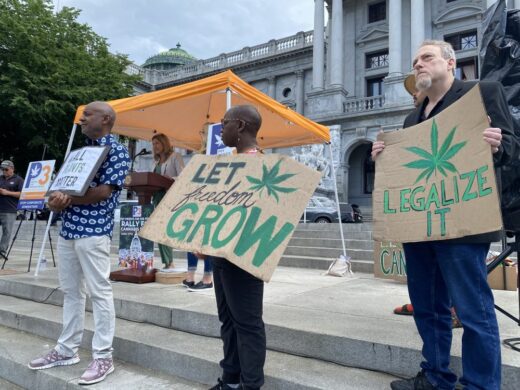Spotlight PA is an independent, nonpartisan, and nonprofit newsroom producing investigative and public-service journalism that holds power to account and drives positive change in Pennsylvania. Sign up for our free newsletters.
By Stephen Caruso & Kate Huangpu | Spotlight PA

Credit: Ed Mahon/Spotlight PA
In his state budget pitch, Democratic Gov. Josh Shapiro called for the Pennsylvania legislature to legalize recreational marijuana.
Shapiro is not breaking new ground. His predecessor, Democrat Tom Wolf, came out in support of legalization in 2019 and unsuccessfully pushed for it in his final years in office.
But while Wolf faced a completely Republican-controlled legislature, Shapiro has the benefit of a Democratic-led state House.
And it appears attitudes in the still GOP-dominated state Senate are shifting. The state senator who controls a key committee supports legalization, and the lawmaker in charge of setting the chamber’s agenda has expressed a willingness to explore the topic despite his belief that Pennsylvania should wait for the federal government to act.
“The real question is: What are the details of how he sees that [proceeding]?” state Senate Majority Leader Joe Pittman (R., Indiana) said of Shapiro’s pitch at a news conference in February.
Shapiro’s call kicks off what will be a heavily lobbied debate with a lot at stake — for the state’s coffers, for people who want to take part in a potentially multibillion-dollar industry, and for tens of thousands of marijuana users, many of whom have suffered legal consequences for using the drug in the past.
“A lot of stuff we do, the general public would find it not so interesting,” state Sen. Sharif Street (D., Philadelphia), a prominent legalization supporter, told Spotlight PA. “This is interesting to the public. People are interested. People want it to happen.”
Proponents of legalization argue the commonwealth has fallen behind its neighboring states and misses out on hundreds of millions of dollars in tax revenue while wasting law enforcement resources. They also note the increasingly unpopular ban on the drug’s use has disproportionately harmed Black and brown communities.
Opponents argue that cannabis legalization runs afoul of current federal law, lacks supporting research, and opens the door to a burgeoning industry that could quickly accumulate market power without proper guidelines to protect public health and safety.
Shapiro offered a rough outline of his vision for legalization, leaving most of the details up to the legislature.
The industry, he said in his February budget address, should be “regulated and taxed responsibly.” The final proposal, he continued, should create jobs and invest in “the communities that have been disproportionately harmed by criminalization.” He also asked that individuals “convicted for nonviolent possession of small amounts of marijuana have their records expunged.”
His executive budget assumed taxes on legalized recreational sales would bring in about $250 million in annual revenue within five years.
Should Pennsylvania lawmakers take up Shapiro’s call and move toward legalizing marijuana, they would be in charge of hammering out essential details like who can grow and sell the drug and how to regulate the market.
State Sen. Dan Laughlin (R., Erie), who with Street has introduced a legalization bill, told Spotlight PA that he was “highly doubtful” that any existing legislation would pass without changes.
“Moving through the process,” he said, “there’s going to be a lot of people who want to influence what the final product is like.”
Building the industry
State lawmakers have already presented dueling visions of how marijuana legalization should work in Pennsylvania.
A bill in the state House and another in the Senate would allow recreational usage at 21 years of age and expunge nonviolent cannabis convictions such as possession, a priority for Shapiro and legislative Democrats.
The proposals otherwise differ, with one putting the state in charge of sales, and the other giving the existing industry a green light to expand.
The state House bill, sponsored by 20 Democrats, would direct the Pennsylvania Liquor Control Board to establish state-run cannabis shops similar to the retail stores that sell wine and spirits. That provision is backed by United Food and Commercial Workers International, an influential labor union that represents some medical marijuana workers as well as state liquor store clerks.
The union has argued that state-run retail will allow a quicker start to commercial sales and bring in more revenue by taxing marijuana growers and processors in addition to customers. Pennsylvania’s marijuana industry opposes this idea.
In an email, Meredith Buettner, executive director of the Pennsylvania Cannabis Coalition, said that state-run retail stores could put Pennsylvania on a collision course with the federal government and undercut an industry that has already invested hundreds of millions of dollars in the commonwealth.
The state Senate bill, introduced by Laughlin and Street, would use Pennsylvania’s existing medical marijuana infrastructure — which includes 178 dispensaries — to sell recreational cannabis. This is the path favored by Cresco Labs, Trulieve, and many of the other publicly traded, multistate companies that sell medical marijuana in Pennsylvania.
“The current dispensary infrastructure is the best way to add an adult-use market safely and swiftly,” Angela Zaydon, a lobbyist for Trulieve, told state House lawmakers at a February hearing on recreational cannabis.
Cannabis is already a lucrative business in Pennsylvania. Dispensaries reported almost $5 billion in total sales through July 2023, according to the state Department of Health.
Spotlight PA has identified at least 24 marijuana companies or trade organizations that employ at least nine lobbying firms. Among those registered to lobby are at least seven multistate operators, whose growing market share could give them an outsized role in crafting marijuana policy.
Industry executives told state House lawmakers that they want the commonwealth to keep cannabis possession illegal until the recreational industry is off the ground, crack down on unregulated sales in gas stations and convenience stores, and create a new agency solely charged with regulating sales.
They oppose Shapiro’s proposed 20% tax — which would be on top of the state’s 6% sales tax — because it would make Pennsylvania uncompetitive with neighboring states, they argue. That tax rate would likely drive consumers to cross state lines or purchase from the black market, they add.
That outcome would defeat the point of legalization, which is to get consumers “into safe, regulated … products, not somebody buying something down the street,” Shelly Edgerton, a former Michigan regulator who now lobbies for PharmaCann, told the state House panel. The company is a marijuana grower and retailer that operates in eight states, including Pennsylvania.
Lawmakers, particularly the Democrats who run the state House, insist that legalization must spread the economic benefits among small-business owners and people who have been harmed by marijuana criminalization.
Allowing medical marijuana businesses to immediately jump into recreational sales would give those larger and publicly traded companies a competitive advantage, argued Shaleen Title, a former Massachusetts marijuana regulator turned cannabis consumer advocate.
Those companies “usually can conflate their profit motive with the legitimate desire of marijuana consumers to be able to access legal products more quickly,” Title said in an email. “But giving themselves an advantage reduces competition and hurts consumers in the long term” by increasing prices and reducing the number of distributors, she said.
Their influence has raised some mumbles of discontent from grassroots legalization advocates and some lawmakers. But lobbyists’ jockeying is par for the course, argued legalization champion Street.
“Members of the General Assembly are big boys and girls,” he told Spotlight PA, “and we can handle a little bit of discussion from lobbyists.”
The state House bill would allow adults to grow limited amounts of cannabis in their homes. Lawmakers who support such a change say that this will lower costs, increase accessibility for users, and bypass the current cannabis sellers that dominate the industry.
“Will everybody grow? No, they won’t,” Cherron Perry-Thomas, who runs a marijuana marketing firm and has advocated for racial equity within the industry, told Spotlight PA. “However, I think people should have the right.”
This exception is part of a wider wishlist of social equity policies tied to marijuana legalization, such as expunging criminal records of those convicted of marijuana-related crimes and exclusive access to a pool of industry licenses.
Lawmakers and racial justice advocates say that such policies need to be included in any deal that would legalize recreational marijuana.
Shapiro proposed that $5 million of revenue be funneled into a restricted account for restorative justice efforts annually. Other states have earmarked far more.
Unanswered questions
Critics of legalization have focused on the unknowns — namely, the impact of higher potency products on consumers and the additional costs to deal with unintended consequences, from increased addiction and mental health treatment to increased policing of the state’s roads.
Studies have suggested some connection between increased marijuana consumption and car crashes, and law enforcement officers have expressed concerns about how they will be able to survey high drivers.
“For every dollar that we realize revenue, what are we going to pay?” asked Scott Bohn, executive director of the state police chiefs association and member of the state’s Medical Marijuana Advisory Board. “What would the expense of this public policy be? There’s questions we would like answered.”
Those concerns have been echoed inside the Capitol, mostly by conservative Republican lawmakers.
“From what I’m seeing across the nation, I am not one at this time to jump on the bandwagon,” state Rep. Kathy Rapp (R., Warren), ranking Republican on her chamber’s Health Committee, said at a hearing.
Some lawmakers and advocates have pushed to decriminalize marijuana possession and further expunge nonviolent cannabis convictions in the short term while policymakers debate the details of legalization — especially as there’s no guarantee that any such legislation will pass.
“No state has gotten this perfect, and we’re not going to get it perfect in Pennsylvania,” marijuana activist Chris Goldstein told Spotlight PA. “But what every state has done right is that they started out with the justice aspect, and that means stopping simple possession arrests.”
Pennsylvania State Police arrested more than 10,600 people in 2022 whose highest-graded offense was possession, according to state data Goldstein analyzed.
“We could certainly live with decriminalization,” Bohn, the former police chief, told Spotlight PA.
Under state law, possession of less than 30 grams of marijuana is a misdemeanor punishable by up to 30 days of jail time and a $500 fine. Street and state Sen. Camera Bartolotta (R., Washington) have introduced legislation that would make possession a summary offense, similar to a speeding ticket, and reduce the penalty to a maximum fine of $25. The fine would be $100 for smoking in a public place such as on the street or in a park.
Street told Spotlight PA that decriminalization was “within the realm of possibility.” But Laughlin, his GOP partner on the legalization bill, said he was worried decriminalization would create a black market and might detract from the larger goal.
“It would actually delay the legalization push,” Laughlin said, “because then there would be the argument: Why bother?”
BEFORE YOU GO… If you learned something from this article, pay it forward and contribute to Spotlight PA at spotlightpa.org/donate. Spotlight PA is funded by foundations and readers like you who are committed to accountability journalism that gets results.








